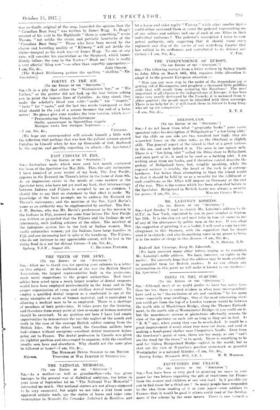THE TEETH OF THE ARMY.
[To TUE EDITOR OF TUE •• SFECTATOR.”] Sta,--Allow me to thank you for opening your columns to a letter on this subject. At the outbreak of the war the British Dental Association, the largest representative body in the profession. made many suggestions to the proper authorities. Had their advice been acted upon a much larger number of dental surgeons would hove been employed professionally in the Army and in the proper organization of camp and civilian dental treatment. To employ a qualified dental surgeon as n combatant is one of the many examples of waste of human material, and is equivalent to allowing a medical man to be so employed. There is a shortage of members of both professions. It takes years for the training, and therefore from every point of view economy of human material should be exercised. In my position out ]sere I have had ample opportunities to demonstrate the terrible neglect of the mouth and teeth in the case of the average British soldier coming from the British Isles. On the other hand, the Canadian soldiers have had—almost without exception—excellent dental treatment before going out to France. The dental profession in Canada was given its rightful position and encouraged to organize, with the excellent results seen here and elsewhere. Why should not the same plan he followed at Lome?—I am, Sir, he.,
THE HONORARY DENTAL SERMON TO THE Emma Iffirren. l'arlintart13 OP Watt INTERNED IN SWITZFIrrito:


































 Previous page
Previous page